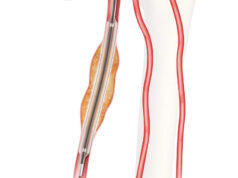For a specialty with less than 5,000 members in the United States, vascular surgery certainly has an abundance of societies – SVS, SAVS, ISVS, SCVS, etc. However, I am proposing a new one, the SOS (Save Our Saphenous) devoted to saving the saphenous vein.
At the outset, I know that ablation of the saphenous has a definite role in the management of venous disease. I have ablated many myself – but must every human being on this planet have theirs removed? Has it become the appendix of the venous system, a redundant vestigial organ with no apparent reason for existence, placed in the leg simply to provide an income for starving physicians?
I believe all of us have been horrified seeing some unfortunate young woman who initially went to a “Vain” Clinic for a single spider vein and had the great and small saphenous veins ablated from both legs. Thousands of dollars out of pocket, often with legs scarred or burned and still with a spider vein, she shows up wondering why the magic laser did not eradicate her red spot.
And what about the elderly patient with a longstanding cardiac history who, while in her cardiologist’s office, was told that she needed her asymptomatic varicose veins removed and her saphenous obliterated? We have all seen patients who were told they need their vein ablated after a duplex scan performed by some fly by night lab, yet when we repeat the study it’s completely normal. Are those physicians simply uneducated or are they committing fraud, and even more seriously, physically abusing the patient?
It seems that ablation of the saphenous vein has become an industrialized initiative. Vein clinics and vein specialists are being established faster than Starbucks. Soon there will be one on every street corner — perhaps even in the airport. Moreover, they are run by entrepreneurial doctors from virtually every walk of life irrespective of their training or education in venous disease.
They include anesthesiologists, gynecologists, and even podiatrists. Why, even retired cardiac surgeons who spent their whole professional lives saving their patients by using the saphenous are now advertising themselves as board-certified vein specialists and are destroying normal veins as fast as they can say the word “Dollar.”
Will we soon be seeing veterinarians also climbing on the vein bandwagon? Go to a weekend meeting, learn from a company rep, and then advertise yourself as a vein expert. It’s easy! And worse still, are some of our own also to blame?
Insurance carriers are just beginning to realize that there is something fishy going on. Now even the truly symptomatic are required to wear stockings, exercise, and lose weight before they can undergo appropriate treatment. I foresee a time when our symptomatic patients will have to provide photographic evidence that they spent at least part of everyday walking on their hands with their feet in the air.
Moreover, what’s up with patients who go to vein screenings? What do they really think those ugly blue tubes up and down their legs are an alien’s tentacles? And why do they need to be screened — don’t they own a mirror?
Venous disorder screenings offered through the auspices of the American Venous Forum are designed to educate patients about treatment options, risks for VTE, chronic venous insufficiency, etc., and have a true benefit. But the “doc-in-a-box” varicose vein screening is simply a come on to induce patients to have an unnecessary ablation.
So I think it is time for vascular surgeons to become the white knights and join the noble SOS. Take the time to educate our patients and medical colleagues that they may need to reconsider who they use for vein treatment and refer to vascular surgeons who are specifically trained to know about venous disorders.
A knowledgeable vascular surgeon will treat the vein because it needs to be treated and not because its removal helps pay the doctor’s mortgage. Someone who knows that unnecessarily ablating a normal vein will not improve the patient’s cosmetics or symptoms; that ablating the vein may at some later time limit their patient’s chance to have a functional leg or coronary bypass. Who knows that patients may even die because they had their vein destroyed. For what specialty of physician knows more than vascular surgeons about the importance of the saphenous as a potential conduit for life- or limb-saving surgeries? What other specialty can fully appreciate when it is really necessary to sacrifice the vein?
So I encourage all vascular surgeons to join the SOS. However, as a disclaimer, I would like to point out that I am the Founder, Secretary, Treasurer, and President-for-Life of the SOS. I expect to receive no financial remuneration since I am spending most of my time saving the saphenous vein.
Dr. Samson is a clinical associate professor of surgery (vascular), Florida State University Medical School, a member of Sarasota Vascular Specialists, Sarasota, Fla., and the medical editor o Vascular Specialist.













